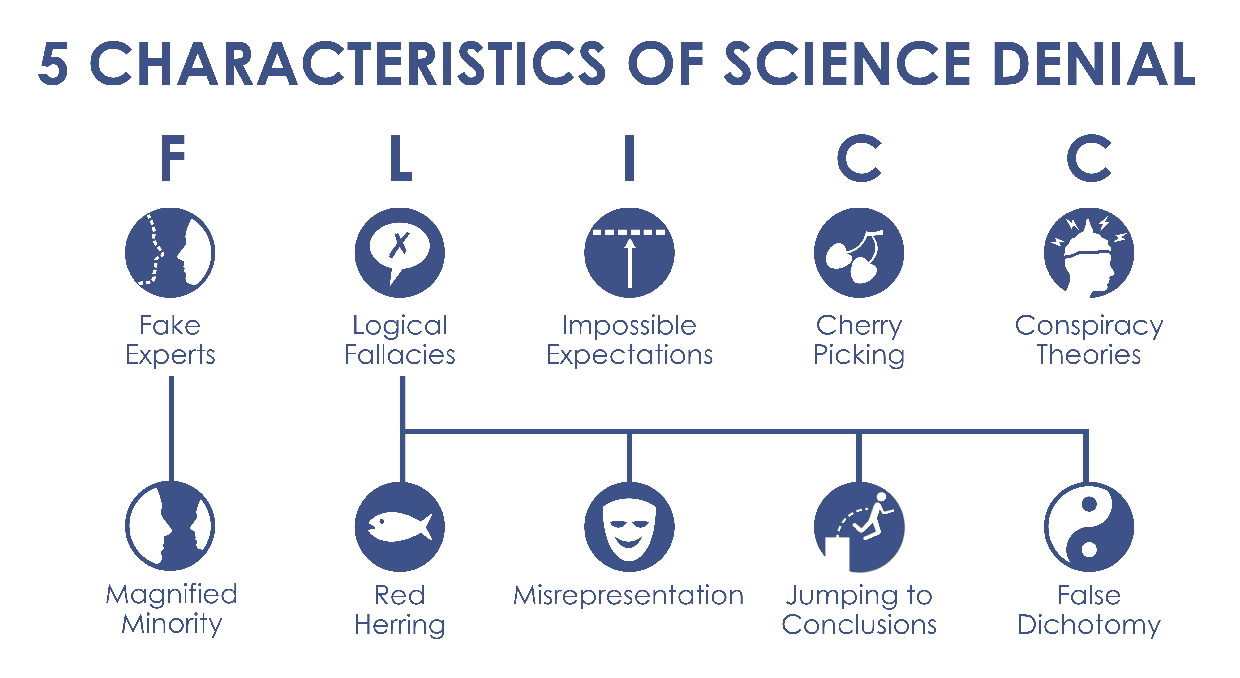![The gap between the public perception and the reality of the expert consensus on human-caused global warming. [Source]](http://scisnack.com/wp-content/uploads/2015/07/Consensus_Gap.jpg)
The gap between the public perception and the reality of the expert consensus on human-caused global warming. [Source]
First, let us determine what is meant by science denial and how it is different from science skepticism. A science skeptic considers all evidence before coming to a conclusion, similar to the scientific method. Therefore, every scientist is a skeptic at heart, until all lines of evidence identify only one possible conclusion. This is very different from a science denier. That is someone who comes to a conclusion first and then rejects all evidence that disproves that conclusion.
It is important to mention that not everyone that denies climate science intends to do so. Science denial can be the result of a person not having the right background knowledge to understand the issue, unconscious psychological processes that reinforce previous existing ideas, political preference or religious beliefs. However, there are science deniers who actively and publically fight the scientific consensus. That is because creating doubt about this consensus within the general public has been shown to be the single, most successful strategy to delay action.
Science denial is not a recent development. There are numerous examples of society rejecting science, sometimes with horrible consequences for the scientist involved (think of Galileo Galilei). The Earth revolving around the Sun, biological evolution, and more recently, smoking causing lung cancer or the effect of vaccinations… new scientific evidence is often met with doubt in society. Despite science denial affecting different scientific fields, there are five common characteristics of denial: F.L.I.C.C. [4]. Let me explain.

The five characteristics of science denial, F.L.I.C.C., and associated sub-characteristics. [Source]
L – Logical fallacies – A logically false argument that leads to a wrong conclusion. There are numerous ways to do so: by presenting irrelevant information (‘red herring’), misrepresenting or over-simplifying the science, jumping to conclusions, or only presenting two options when there are more available (‘false dichotomy’). The myth that CO2 is a trace gas and therefore cannot cause global changes is an example of a red herring and jumping to conclusions, it skips over all science of how the greenhouse effect works. An example of a false dichotomy is the often misrepresented relation between temperature and CO2 concentrations: CO2 causes warming and warming causes CO2 increases. The two are involved in a positive feedback: it is not a case of either-or, both are true.
I – Impossible expectations – Requiring unrealistic standards of proof before acting on science. The tobacco industry made great use of this strategy to cast doubt and establish controversy on advancing medical knowledge. In the case of climate science, terms like ‘extremely likely’ in the IPCC report (used to refer to probabilities larger than 95%) have been used to argue that scientists are not sure of their results.
C – Cherry picking – You may have come across statements that in recent years (for example since 1998) global temperature is not increasing anymore and therefore global warming is not happening. This myth is an example of cherry picking, it is based on a small, carefully selected, part of the available data. All data from before 1998 are ignored and also data showing continued ocean warming and ice cap melting in the same period are ignored. If all available data are taken into account, there is no grounds for such a statement.
C – Conspiracy theories – If all else fails, the last resort is the conspiracy theory. Surely, it can’t be a coincidence that scientists need volunteers to go on a one-way space mission to Mars at the same time as they are telling us all that life on Earth is going to fall victim to increased droughts, hurricanes and migrating bugs [5]? More seriously, it is often suggested that scientists have had to rebrand ‘global warming’ to ‘climate change’ to make the facts more agreeable, presumably they did so because the term climate change could include events of cooling as well. This argument conveys scientists as people with a political agenda, rather than impartial people investigating data to find evidence.
The course has given me new insights on climate science denial and I hope that my newly acquired knowledge and skills will contribute to me becoming a more successful climate scientist. It has given me new ways to frame my argument when discussing climate change and counteract expressions of climate science denial. In a next post (available here) I will discuss how you too can deal with and debunk climate science denial, by means of interesting methods like ‘inoculation theory’ and ‘sticky science’.
If your interest has been sparked, or you cannot wait for part 2 of this ClimateSnack post to become available, the course ‘Denial101x: Making Sense of Climate Change Denial’ from the University of Queensland is available online and is free for all to participate in.
References
[1] P.T. Doran and M. Kendall Zimmerman (2009): Examining the Scientific Consensus on Climate Change. EOS, 90, 22-23, doi: 10.1029/2009EO030002.
[2] W.R.L. Anderegg, J.W. Prail, J. Harold and S.H. Schneider (2010): Expert credibility in climate change. Proceedings of the National Academy of Sciences of the United States of America, 107, 12107-12109, doi: 10.1073/pnas.1003187107.
[3] J. Cook, D. Nuccitelli, S.A. Green, M. Richardson, B. Winkler, R. Painting, R. Way, P. Jacobs and A. Skuce (2013): Quantifying the consensus on anthropogenic global warming in the scientific literature. Environmental Research Letters, 8, 024024, doi: 10.1088/1748-9326/8/2/024024.
[4] P. Diethelm and M. McKee (2009): Denialism: what is it and how should scientists respond? The European Journal of Public Health, 19, 2-4, doi: 10.1093/eurpub/ckn139.
[5] D. Burnett (2014): Climate change is an obvious myth – how much more evidence do you need? The Guardian, 25 November 2014, comedy article, link.







